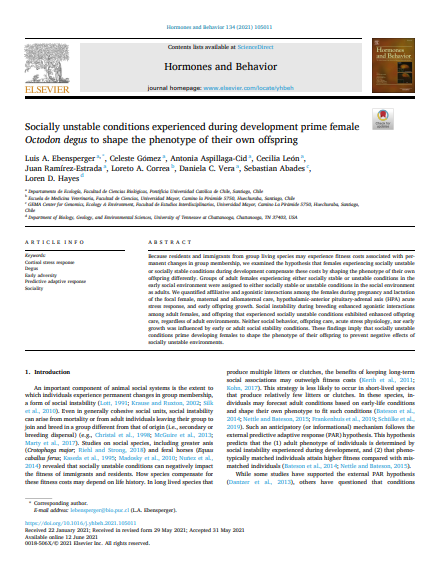Socially unstable conditions experienced during development prime female Octodon degus to shape the phenotype of their own offspring

Fecha
2021-08Autor
Ebensperger, Luis A.
Gómez, Celeste
Aspillaga-Cid, Antonia
León, Cecilia
Ramírez-Estrada, Juan
Correa, Loreto A. [Univ Mayor, Fac Ciencias, Escuela Med Vet, Chile]
Vera, Daniela C.
Abades, Sebastián [Univ Mayor, Fac Estudios Interdisciplinarios, GEMA Ctr Genom Ecol & Environm, Chile]
Hayes, Loren D.
Ubicación geográfica
Notas
HERRAMIENTAS
Acceda a títulos restringidos
¿Cómo descargar?Resumen
Because residents and immigrants from group living species may experience fitness costs associated with permanent changes in group membership, we examined the hypothesis that females experiencing socially unstable or socially stable conditions during development compensate these costs by shaping the phenotype of their own offspring differently. Groups of adult females experiencing either socially stable or unstable conditions in the early social environment were assigned to either socially stable or unstable conditions in the social environment as adults. We quantified affiliative and agonistic interactions among the females during pregnancy and lactation of the focal female, maternal and allomaternal care, hypothalamic-anterior pituitary-adrenal axis (HPA) acute stress response, and early offspring growth. Social instability during breeding enhanced agonistic interactions among adult females, and offspring that experienced socially unstable conditions exhibited enhanced offspring care, regardless of adult environments. Neither social behavior, offspring care, acute stress physiology, nor early growth was influenced by early or adult social stability conditions. These findings imply that socially unstable conditions prime developing females to shape the phenotype of their offspring to prevent negative effects of socially unstable environments.
URI
https://repositorio.umayor.cl/xmlui/handle/sibum/9177https://www.sciencedirect.com/science/article/abs/pii/S0018506X21000908
https://doi.org/10.1016/j.yhbeh.2021.105011
https://doi-org.bibliotecadigital.umayor.cl:2443/10.1016/j.yhbeh.2021.105011
Coleccion/es a la/s que pertenece:
Si usted es autor(a) de este documento y NO desea que su publicación tenga acceso público en este repositorio, por favor complete el formulario aquí.